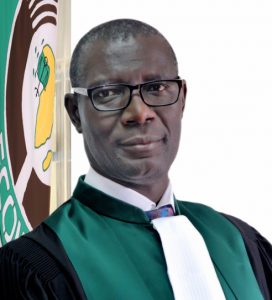Introduction
This is a very unique case; it is unique, not just for the rule of law it contains or the operative part of the judgment, but also for the fact that the case was brought by a Judge (Justice Aladetoyinbo) of the Nigerian judiciary in respect of a disciplinary measure taken by the National Judicial Council (NJC) – a body responsible, inter alia, for the appointment, promotion and discipline of judicial officers in Nigeria.
The invocation of the jurisdiction of the court by a municipal judicial officer is important in that it signals the growing importance of the Community Court of Justice, ECOWAS (ECOWAS Court) and its influence within the region. Justice Aladetoyinbo’s application before the Court creates the hope that time will close the gap between municipal judiciaries and the Court. This case and the decision of the Court will certainly get the attention of judiciary officers up and down Nigeria, in particular, and the ECOWAS region, at large. We look forward to when Judges, like the Applicant in this case, who believe in the work of the ECOWAS Court, will begin to cite the jurisprudence of the Court, thereby incorporating it into municipal case law and creating the needed rapprochement between the jurisprudence of the ECOWAS Court and municipal courts.
The Facts of the Case
In the case, the Applicant alleged that the Respondent violated his right to fair hearing, and freedom from torture in that the NJC subjected him to a disciplinary process which culminated in a widely publicised written warning, causing him great mental torture as it destroyed his integrity, respect and good name and thus violated his right under article 5 of the African Charter on Human and Peoples’ Rights (the African Charter) and article 3 of the Universal Declaration of Human Rights(UDHR)
The issue that gave rise to the present action emanated from a judgment delivered by the Applicant (as a Judge of the High Court of the Federal Capital Territory of Nigeria) in favour of the Plaintiff in the case of Bill Construction Nigeria Limited v. Gazi Construction Company Limited, Suit No FCT/HC/CV/219/96. The judgment was affirmed, on appeal to the Court of Appeal. However, after the Appeal Judgment, one U.L.O Consultants Limited filed Suit No FCT/HC/CV/4594/11 and joined the Plaintiff/Judgement Creditor in the original suit as Defendant, claiming ownership of part of the Plot that had been held to belong to the Plaintiff in the judgment delivered by the Applicant in the earlier case and affirmed by the Court of Appeal. The motion for stay of execution of the judgment
of the Appeal Court judgment affirming the judgment of the Applicant in favour of the Plaintiff in the original matter as the legitimate owner, having been struck out, a warrant of possession was issued.
Whereupon U.L.O Consultants Ltd, and another, petitioned the NJC. The Applicant was thereupon invited by the NJC to appear before an investigation committee where he made his presentation. Thereafter, the NCJ Committee recommended that the Applicant be issued a warning letter, which was published on television, in the print and on the internet. Further to the recommendation, on the 26th of March, 2018, the Applicant received a warning letter from the NJC through the Hon. Chief Judge of the High Court of the Federal Capital Territory. He was also
placing on the NJC watch list for 9 months.
The Applicant contended that the Committee, which investigated the petition, was not properly constituted when it heard and arrived at its decision. This is because the Committee was constituted as a two (2) member tribunal, namely: Hon Justice Kassim Zannah and Hon Justice Abdullahi Yusuf with Mrs Balogun A.M (Mrs) as the Secretary. The Committee deliberated twice before concluding the matter. At the first hearing on the 23rd October, 2017, all the members were present but on the second hearing on the 9th of January, 2018, while Hon Justice
Abdullahi Yusuf was absent, Hon Justice Kassim Zannah, sitting alone, took evidence and concluded the deliberation. Hence, the Applicant contended that the hearing was conducted in fundamental breach of the Rule of law, a violation of his right to a fair trial under the African Charter on Human and Peoples’ Rights and therefore a nullity.
The Applicant’s application before the ECOWAS Court, sought, inter alia, a declaration that the letter of warning, issued and published to the world press by the agent of the Respondent (the NJC) constituted grave and grievous perversion of justice that has mentally tortured, traumatized and demoralized the Applicant. Also, that it destroyed his integrity, respect, honour and good name built over four (4) decades of very excellent services to the Federal Republic of Nigeria, in that
the verdict of the investigation Committee published to the world press by agent of the Respondent (the NJC) is different and more libellous than the actual verdict of the NJC handed over to the applicant and this constitutes an injury to the reputation of the Applicant by the NJC as the agent of the Respondent. The Applicant further sought an order setting aside the verdict of the Committee for constituting public display of official power, gross abuse of power and reckless abuse of power. He also requested apology in national dailies and pay
compensation.
The ECOWAS court dismissed all grounds of preliminary objection raised by the Respondent and affirmed its jurisdiction to hear the case. In doing that, though, the Court skilfully avoided being drawn into the realm of defamation, it stayed on the aspects of the Application properly belonging to human rights.
On the merit of the case, the Court held, inter alia, that the proceedings was nullified by the absence of a member during one of the meetings of the Committee. In consequence, the Court held that the recommendation of the Committee has no legal validity and can confer no right nor impose any obligation on anybody. Based on these findings, the Court held that the issuance of a warning letter and the placing of the Applicant on the judicial watch list, having being rendered by an incompetent tribunal, is a violation of his right to fair hearing contrary to article 7 of the African Charter.
In reaching its decision on the composition of the Committee, the ECOWAS Court relied on its previous case of Afolabi Olajide v FRN (2004) ECW/CCJ/04 page 65 paragraphs 32 (1-3) and the Nigerian Supreme Court case of Adeleke v Oyetola, 2020 6 NWLR 449 92, wherein it upheld the decision of the Court of Appeal that declared a nullity, a judgement delivered by a judge who did not sit with the others on the one of the proceedings of the Governorship election. The apex Court was of the opinion that his absence at one of the sittings certainly
affected the competence of the tribunal.
Analysis
While the decision that the assumption of the function of the Committee by a member of the Committee violates the Applicant’s right to fair hearing is unassailable, it is doubtful whether the Court has reached this conclusion on a sound legal premise. A reading of Afolabi’s case would clearly show that it did not decide the matter to which it has been applied. Beyond stating the general rule that it has to be shown that a court “is properly constituted as regards numbers and qualifications of the members of the bench, and no member is disqualified for
one reason or another”, Afolabi did not decide on the effect of the absence of a member of a validly constituted Tribunal. Whereas, in the present case, the question of whether the Committee was validly constituted was not before the Court. Even if it were, and the ECOWAS Court decided the question in Afolabi, there yet was an expectation that the Court would explain how such a decision would apply to an administrative committee.
The Court was obviously carried away by its reliance (albeit persuasively) on the Nigerian Supreme Court case of Adeleke v Oyetola, which is closely analogous to the case at bar, except that Oyetola relates to a judicial tribunal and not an administrative Committee. This appears, from all indication, to be the fulcrum of the Court’s decision. The question that may be asked is why the Court should even bother to rely on the said Nigerian case, when it could have simply relied on the African Charter, given that the lone sitting by one of the committee members did violate the right of the Applicant to fair hearing, as the ECOWAS Court rightly found. There was therefore no need to declare that: “[c]onsequently the allegation that only one member of the Committee sat to hear the case on 9th of January, 2018, same being uncontroverted, establishes as a fact the irregularity of the Committee with regards to its numbers and a conclusive proof of its incompetence which renders the decision emanating from it a nullity”.
While the reliance on the Nigerian Supreme Court decision may be hastily commended as an indication of the preparedness of the ECOWAS Court to forge a cooperative relationship with municipal courts, this kind of municipal excursion is one that must be applied with great hesitation less ECOWAS Court begins to cede its jurisprudential autonomy to the case law of municipal courts of individual State parties in cases arising from their jurisdiction. This can only eventuate in jurisprudential chaos as against the unifying role ascribed to the court; that of carefully and thoughtfully creating a uniform jurisprudence (jurisprudence Union) for all member States in matters within its competence.
It cannot be stressed enough that, “from the standpoint of international law and of the court which is its organ, municipal law are merely facts which express the will and constitute the activities of states, in the same manner as do legal decisions and administrative measures” – Certain German Interest in Polish Upper Silesia (1930), PCIJ, Ser. B, No.17, p. 19. This is not to say that municipal law could not be relevant to cases before the court, the court must find that the law is such that
is generally accepted across members States of the common law and civil law persuasions alike. The fact that a case emanates from a member State does not mean that the court should look to the courts of that State for guidance: this can only produce the fragmentation of the jurisprudence of the Court.
On the compensation awarded, would it not have been better not to award anything at all than awarding Fifty Naira (N50.00) as compensation? While not denying the right of the Court to award what it thinks fit, even as a symbolic gesture, the Court must be careful not to ridicule or embarrass a successful Applicant with such a paltry sum.
@Centre for Community Law@2023








